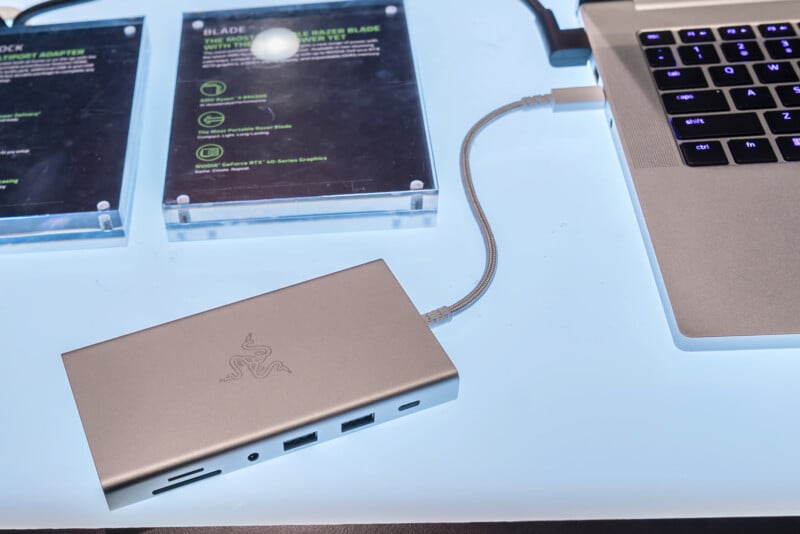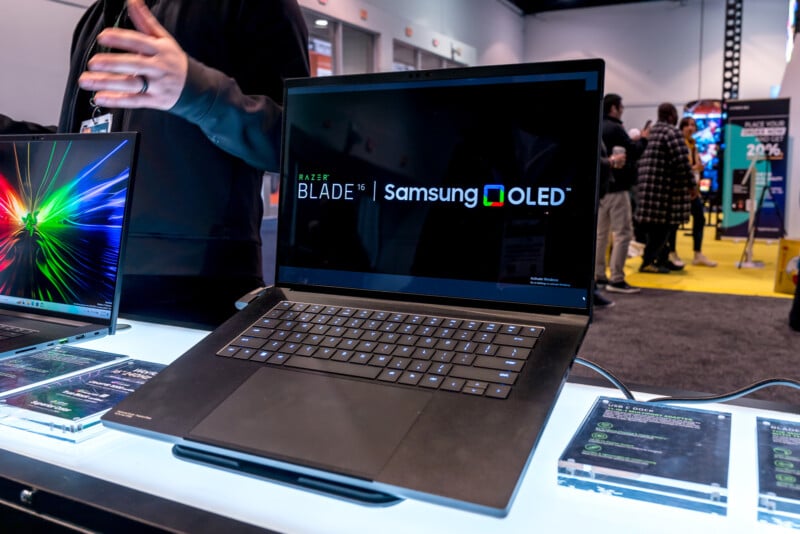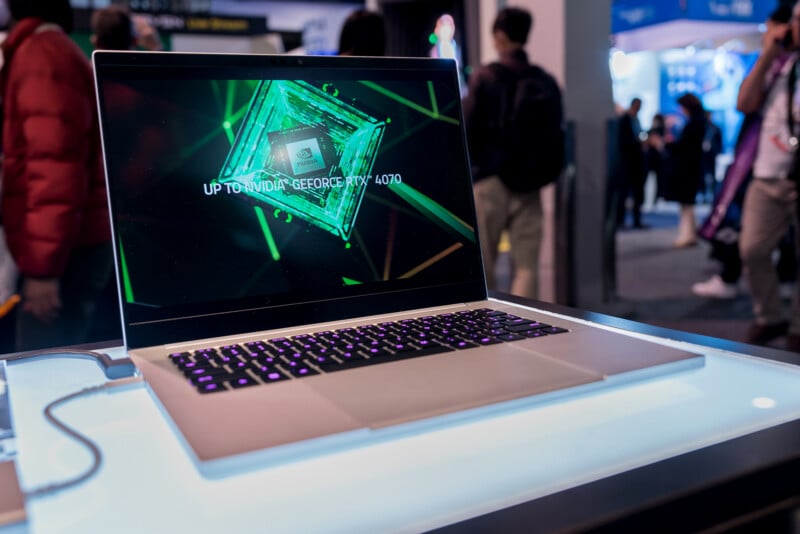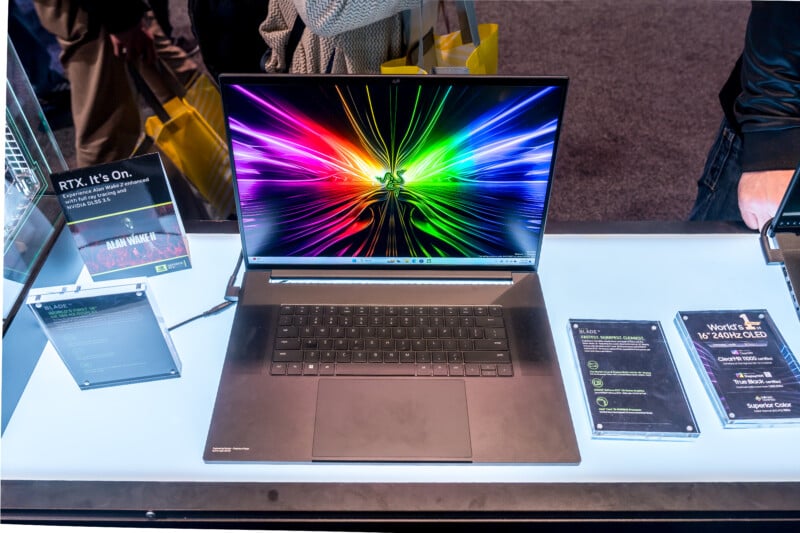![]()
Razer had a lighter device rollout at CES 2024 compared to previous years, but new versions of its Blade laptops continue to make a case for content creators.
Given the company’s stature as a gaming brand, the updated trio of Blade laptops come with that pedigree in mind, yet the configuration options and screen vibrancy may also make them compelling choices for content creators. Razer’s marketing is slowly pointing that out since some gamers also work in creative fields. It’s telling that its new USB-C Dock comes with the ports a photographer or videographer would want for editing.

Do gamers often create their own content or work in creative fields? Razer reckons they do, and so, the Blade laptops come with that in mind. It’s just that the company seems to feel it’s a distinction without a difference. Gamers are probably creating content, and creative folks are probably playing games, too.
The Razer Blade 16 is a Vivid Laptop
The Blade 16 already stands out for the 16-inch OLED panel Razer configured with panel-maker Samsung, which is a gorgeous 240Hz panel Razer is touting as a world-first. That it covers 100% of the DCI-P3 color gamut, and has both VESA Clear 11000 and DisplayHDR True Black 500 certifications, is already appealing, but add to that a fast 0.2-millisecond response time, and it’s hard to see gamers complain about what’s missing. True, it’s not 4K resolution, but the QHD+ (2,560 x 1,600 pixels) is easy on the eyes and works well-enough for a laptop of this size. From what I could tell it sports outstanding contrast and color reproduction, though we will need to check it out in a full review to tell if it would suffice for photo and video work.
The previous Blade 16 released in 2023 had a dual-mode mini-LED panel with the ability to switch between Gamer or Creator mode by shifting the refresh rate from 240Hz to 120Hz. Creator mode is also available in the new Blade 16 and you can still switch frame rates the same way too, only now you get the richness of the OLED panel. While I would’ve liked to see more content on it during my time with it at CES, it was hard not to like what I did see.

By any measure, the Blade 16 is a beast. Intel’s newest 14th-gen Core i9 processor and an Nvidia GeForce RTX 4070 mobile GPU come as a base. If you want to go all the way up to a 4090, that’s an option. The configurations for this laptop reach as high as 96GB of RAM and 8TB of storage. What is additionally compelling is that Razer made it modular, so if you decide you want to upgrade the RAM or storage later, you can do so fairly easily — it’s just the GPU you have to be sure about at the time of purchase.
Granted, a fully-loaded, maxed out Blade 16 soars past the $3,000 starting price, hitting $5,500 after all is said and done. That’s a lot for a laptop any way you look at it even if it promises the capability to steamroll through a workflow. It’s worth noting the Blade 16 has an SD memory card slot, which the others don’t have (though the Blade 18 very well might) in another nod to working with images on a bona fide gaming laptop. You won’t have to wait long to find out if your wallet can handle the load because it went on sale the moment Razer announced it.
The Blade 14 and Blade 18 With a Dock in Between
The Blade 14 gets a refresh but not with an OLED panel: you get a QHD+ display with 16:10 aspect ratio and 240Hz refresh rate. It weighs 4.05 pounds and measures 0.7-inches thick, so it’s thin and light, but is just screaming out for a screen like the Blade 16. Razer probably made that a compromise to keep the price down, whatever it might be when the company reveals it sometime this month. Pre-orders are set for the end of January 2024 with availability to follow in February.

Overall, this year’s option is more of a refresh of the 2023 and 2022 Blade 14 models despite the newer AMD chipset and base RTX 4060. There is no memory card slot, unfortunately, so if you want one, you’ll have to bring it with you. That’s where the new USB-C Dock stands in with slots for both microSD and SD-sized cards among the nine other ports. Seen above, the 11-in-1 adapter has one USB-C Thunderbolt 4 port, four USB-A ports, one 3.5mm jack, HDMI, Ethernet, plus another USB-C port for the computer. You don’t have to use it with Razer’s laptops as it works with any PC, Mac, Chromebook, or most iPads and Android tablets.
The mysterious one is the new Blade 18: Razer laid it down on display, but was otherwise mum on details. What is known is that it will be the first 18-inch 4K laptop with a 165Hz refresh rate along with Thunderbolt 5 connectivity, which is a spec that few presented at the show — not surprising given it was only finalized late last year.

The sheer power and speed of Thunderbolt 5 promises to feel significant with a max data transfer rate of 80Gbps, doubling Thunderbolt 4. That kind of throughput would handle two 8K, two 6K or three 4K monitors at one time. That’s all we know for now: no other details on The Blade 18’s other specs, other than that it will share the same modularity with the Blade 16 and Blade 14 when it launches in the spring with the inevitably high asking price.
Image credits: Ted Kritsonis for PetaPixel
